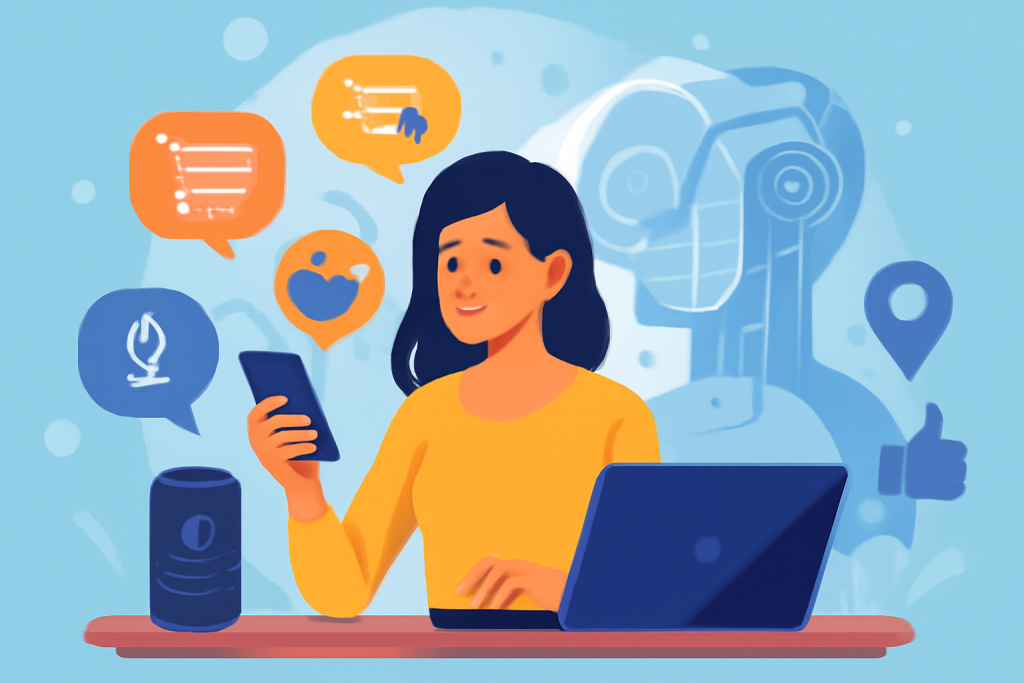Artificial Intelligence (AI) has shifted from a futuristic concept to a vital part of everyday life. It is quietly changing decisions across many areas. From what we buy, how we manage money, to health and social choices, AI plays an unseen but powerful role. This article explores how AI is quietly changing decisions in daily life and what this means for the future.

The Silent Impact: AI Quietly Changing Decisions Every Day
AI no longer exists only in labs or sci-fi movies. Today, AI systems are embedded in the apps, devices, and platforms we use daily. They analyze huge amounts of data to help us make smarter, faster decisions. Often, we don’t even realize AI is involved.
For example, an app might suggest the perfect playlist based on your mood. A digital assistant might help you book dinner. Or software might optimize your home energy use. AI’s quiet support is everywhere. This hidden integration reshapes how people interact with technology and make choices. Ultimately, it improves convenience, personalization, and efficiency.
AI Quietly Changing Decisions in Consumer Shopping
One of the clearest examples of AI quietly changing decisions is in retail and e-commerce. Online platforms use complex AI algorithms. They analyze browsing history, past purchases, searches, and social media activity. This powers hyper-personalized product recommendations and targeted marketing.
- Dynamic Pricing: Retailers use AI to adjust prices in real-time. This reflects demand, stock levels, competitor prices, and buyer behavior. Shoppers often see personalized discounts or flash sales, making purchases more attractive and sometimes more affordable.
- Voice Shopping: AI voice assistants like Amazon Alexa, Google Assistant, and Apple’s Siri have changed how people shop. They allow quick voice commands to order groceries, schedule deliveries, or compare products without typing.
According to McKinsey, over 35% of consumer purchases globally are influenced by AI-powered recommendations. This number is expected to rise as AI improves (McKinsey 2024). Shoppers find new products while retailers increase sales.
AI Quietly Changing Financial Decisions
AI is transforming how people manage money. It affects budgeting, investing, fraud detection, and credit scoring.
- Robo-Advisors: Automated investment platforms use AI to build and adjust portfolios. They consider goals and risk levels. This makes advanced investing strategies accessible and affordable.
- Fraud Detection: Banks use AI to monitor transactions and spot suspicious activity instantly. This prevents fraud better than older methods.
- Credit Scoring: AI looks beyond traditional data. It analyzes utility payments, rent, and online shopping to offer fairer loan decisions. This helps people with limited credit history.
PwC reports AI adoption in finance could add $1 trillion to the global economy by 2030 (PwC 2023). More people will benefit from AI-driven financial advice.
AI Quietly Changing Health and Wellness Decisions
AI is shaping health choices quietly but powerfully.
- Wearables: Devices like Apple Watch and Fitbit use AI to monitor heart rate, sleep, and activity. They provide personalized health tips and alerts.
- Symptom Checkers: AI virtual assistants help users assess symptoms and decide if they need medical care. This reduces unnecessary doctor visits.
- Mental Health Support: AI apps offer therapy exercises, mood tracking, and stress relief tools. They increase access to mental health resources.
The World Health Organization states AI health tools improved chronic disease management for 40% of users worldwide in 2024 (WHO 2024). This shows real benefits.
AI Quietly Changing Social and Information Decisions
Social media platforms use AI to decide what users see. This influences opinions and conversations.
- Content Personalization: Algorithms curate news feeds and ads that match user interests, boosting engagement.
- Content Moderation: AI detects harmful or false content faster than humans. But balancing censorship and free speech remains a challenge.
Recognizing AI’s role helps users understand online biases and filter bubbles.
Emerging Ways AI Is Quietly Changing Decisions
AI’s impact keeps growing in new areas:
- Hiring: AI screens resumes and predicts candidate success. This speeds recruitment but raises fairness questions.
- Smart Cities: AI manages traffic, energy, and services based on real-time data, improving urban life.
- Education: AI personalizes learning plans based on student progress, enhancing education.
AI is no longer isolated. It partners in decision-making across society.
What’s Next for AI Quietly Changing Decisions?
AI’s role will deepen and become more transparent:
- Explainable AI: Systems will explain why decisions are made, increasing trust.
- Ethical AI and Regulation: Rules will ensure AI is fair, private, and accountable.
- Augmented Intelligence: AI will assist humans, providing insights and suggestions.
This partnership promises smarter choices with careful oversight.
How to Benefit from AI Quietly Changing Decisions
To make AI work for you:
- Try AI Tools: Use AI apps for finance, health, and shopping.
- Control Data: Check privacy and understand data use.
- Question AI: Don’t accept AI blindly; seek human advice when needed.
- Stay Updated: Follow AI developments and regulations.
AI already influences your daily decisions. Awareness helps you gain its advantages safely.
References
- McKinsey & Company (2024) The state of AI in consumer purchasing. Available at: https://www.mckinsey.com/industries/retail/our-insights/the-state-of-ai-in-consumer-purchasing (Accessed: 1 June 2025).
- PwC (2023) How AI is transforming the financial sector. Available at: https://www.pwc.com/gx/en/issues/analytics/assets/pwc-ai-in-financial-services.pdf (Accessed: 2 June 2025).
- World Health Organization (2024) Digital health and AI: progress in chronic disease management. Available at: https://www.who.int/publications/i/item/digital-health-ai-chronic-disease (Accessed: 2 June 2025).






